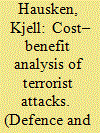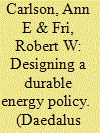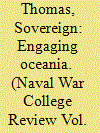| Srl | Item |
| 1 |
ID:
157829


|
|
|
|
|
| Summary/Abstract |
A cost–benefit analysis of terrorist attacks is developed and placed within a systematic theoretical structure. For the target or object of the attack, we consider the lost value of human lives, lost economic value, and lost influence value, counted as benefits for the terrorist. The corresponding losses for the terrorist are counted as costs. The terrorist attacks if benefits outweigh costs. Bounded rationality is enabled where the three kinds of benefits and costs can be weighted differently. We account for two ex ante probabilities of successful planning and attack, and enable the terrorist to assign different weights to its multiple stakeholders. We introduce multiple time periods, time discounting, attitudes towards risk, and subcategories for the benefits and costs. The cost–benefit analysis is illustrated with the 11 September 2001 attack, and 53 incidents in the Global Terrorism Database yielding both positive and negative expected utilities. The paper is intended as a tool for scientists and policy-makers, as a way of thinking about costs and benefits of terrorist attacks.
|
|
|
|
|
|
|
|
|
|
|
|
|
|
|
|
| 2 |
ID:
121038


|
|
|
|
|
| Publication |
2013.
|
| Summary/Abstract |
Although the U.S. energy system seems to resist the changes necessary to meet today's challenges related to energy security and climate change, the system has gone through massive change several times since 1850. A major driver in each of these earlier transitions was an economic value, such as mobility, that markets could capture. Because environmental and security values are public goods, changing today's energy system will require a policy that creates a market signal reflecting these values. However, it is also necessary to craft a policy framework that is both durable over a long time period and able to adapt to new information as it becomes available. This essay examines some of the possible attributes of a durable and adaptable policy. The discussion is necessarily preliminary because relatively little formal research exists on this topic. However, even a preliminary examination suggests that considerations of policy durability could affect the choice between a carbon tax and a cap-and-trade system.
|
|
|
|
|
|
|
|
|
|
|
|
|
|
|
|
| 3 |
ID:
093464


|
|
|
| 4 |
ID:
121782


|
|
|
|
|
| Publication |
2013.
|
| Summary/Abstract |
In the context of the world food crisis 'value-chain agriculture' is emerging as a new frontier of publicly subsidised corporate investment, incorporating smallholding farmers into commercial relations to redress apparent food shortages. This paper conceptualises value-chains as technologies of economic and ecological power, using cross-regional case studies to explore the impact of debt relations in extant value-chain relations. While the value-chain project envisioned by the development industry in partnership with the private sector is geared to 'feeding the world' the likely outcome is (differentiating) smallholders serving corporate markets at the expense of local food security. I argue that developmentalists seek to resolve the crisis through a 'spatio-temporal fix', enclosing smallholders in value-chain technologies financed through debt relations that appropriate value from smallholder communities. At the same time some farmers are seeking to avoid the debt trap by developing strategies to decommodify farming practices to preserve and revitalise their farms as creators of ecological values, rather than simply converters of economic value.
|
|
|
|
|
|
|
|
|
|
|
|
|
|
|
|